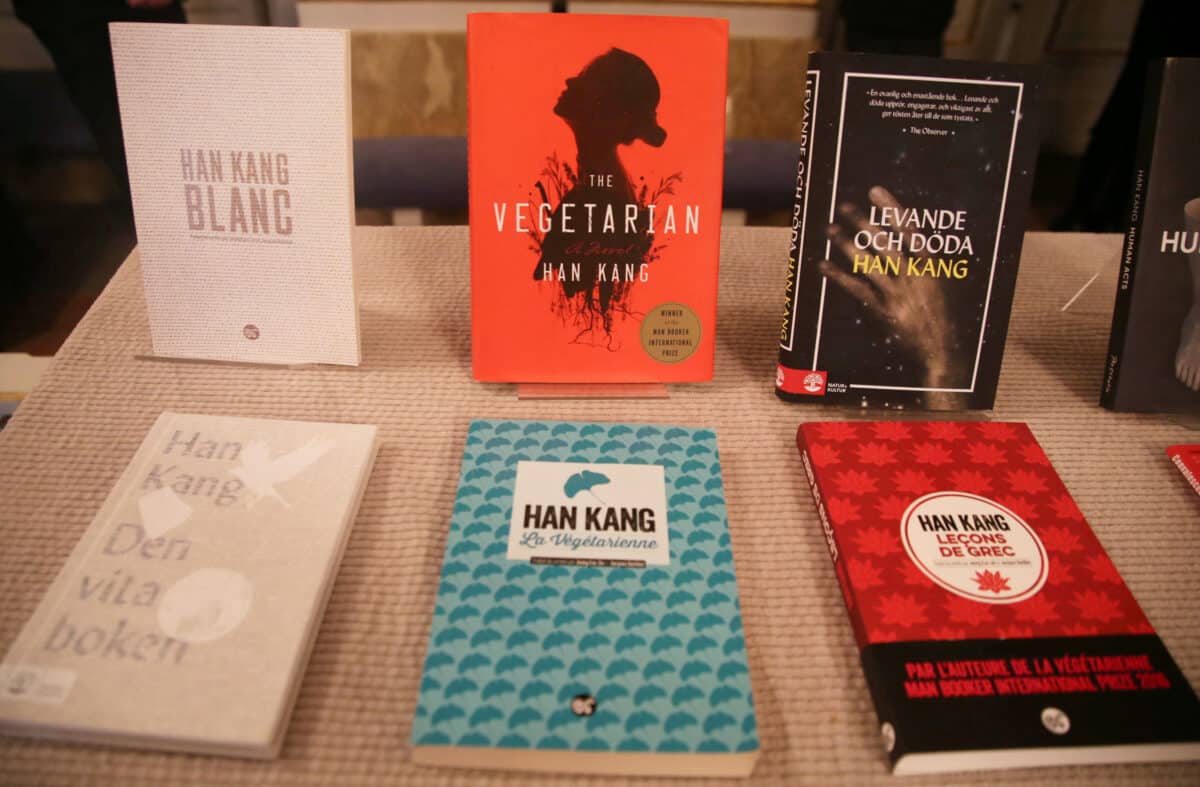
A FIRST FOR AN ASIAN WOMAN Books by South Korean writer Han Kang are displayed in the Swedish Academy after she was named the 2024 laureate of the Nobel Prize in Literature in Stockholm, Sweden, on Oct 10. Right photo shows the acclaimed author, taken in Seoul in 2016. —REUTERS
SEOUL—From President Yoon Suk-Yeol to K-pop megastars BTS, South Korea erupted into celebration on Thursday after novelist Han Kang won the country’s first Nobel Prize for literature.
South Koreans flocked to bookstores on Friday and crashed websites in a frenzy to snap up copies of her work.
The 53-year-old, who also won the Booker Prize in 2016, has long been a key—if somewhat reluctant—figure helping to bring contemporary Korean literature to global attention.
After her Booker win catapulted her into the limelight—and triggered a surge in international sales—Han said she would prefer people to hear her voice “in the form of writing.”
“The best way is, I think, to hide in my room and start writing as soon as possible,” she said.
But her Nobel immediately dominated headlines in South Korea, with Han’s photo appearing on the front pages of news websites and headlines hailing her historic win—the first by an Asian woman.
‘Experimental, sophisticated’
“Is this the start of K-novels?” daily newspaper Munhwa Ilbo wrote, referring to the so-called Korean wave, which has seen the country’s K-pop music and K-drama sweep global charts.
“She has shown K-literature to the world,” it added.
Accolades poured in from across South Korean society, from the president to an ordinary book lover like Oh Ah-young, who expressed surprise at Han’s Nobel win.
“I first read her works during a literature class in college and was hooked by her experimental yet sophisticated style of writing,” said the gallery curator.
“Her work didn’t seem representative of mainstream Korean literature at the time, around 2010, but stood out because of her unique style and distinct genre. I was really surprised by her 2016 Booker Prize win, and now I’m equally surprised by her Nobel Prize,” she added.
South Korea’s leader Yoon congratulated Han. “This is a monumental achievement in the history of Korean literature and a national celebration that brings joy to all South Koreans,” he said.
South Korean author Han Kang. —REUTERS
Almost out of stock
K-pop megastars also reacted quickly to the news, with BTS member RM sharing media reports on Han’s win alongside a crying face and heart emoji.
Fellow BTS member V said on Instagram: “I read your book ‘Human Act: A Novel’ in the army. Congratulations” alongside a bowing emoji.
The country’s largest bookstore chain, Kyobo Book Centre, said sales of her books had rocketed on Friday, with stocks almost immediately selling out and set to be in short supply for the near future.
Soon after Thursday’s announcement, some bookstore websites could not be accessed due to heavy traffic.
Han’s father, well-regarded author Han Seung-won, said the translation of “The Vegetarian,” her major international breakthrough, had led to her winning the Man Booker International Prize in 2016 and now the Nobel.
“My daughter’s writing is very delicate, beautiful and sad,” Han Seung-won said. “So, how you translate that sad sentence into a foreign language will determine whether you win … It seems the translator was the right person to translate the unique flavor of Korean language.”
Painful chapters
Han’s other books address painful chapters of South Korean history, including “Human Acts,” which examines the 1980 massacre of hundreds of civilians by the South Korean military in the city of Gwangju.
Another novel, “We Do Not Part,” looks at the fallout of the 1948-1954 massacre on Jeju island, when an estimated one in ten of the island’s population were killed in an anticommunist purge.
Past Asian winners of the Nobel Prize for Literature include India’s Rabindranath Tagore, Japan’s Yasunari Kawabata and Kenzaburo Oe, China’s Gao Xingjian and Mo Yan, and Japanese-born British author Kazuo Ishiguro.

